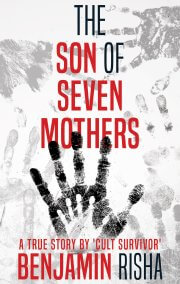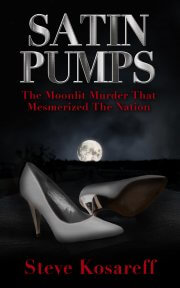
Let us be realistic and admit that making the decision to take your abuser’s life and breath is not that of a weak and wrecked woman. That decision, that action comes at the exact moment when your entire being says “no more.” It is the moment when a woman decides to move forward and save her life. Women who have killed their abusers are not murderers, they are simply women who want to LIVE. Unfortunately, these women are placed on the same playing field as people who have killed for money, for drugs, for revenge, for gain — outright evil, criminally minded, uncaring people. Victims of horrific abuse are none of these. Their only consideration at the moment they commit the decided act is for the preservation for their own life.
For this reason, I will be one of the biggest, loudest advocates for victims of abuse when I am released from prison. I will attempt to move Michigan forward towards a clear and concise understanding of the traumatic effects such abuse has on women, women who act out in desperation to stay alive. These women have been through hell on earth at the hands of someone who claimed to love them, but instead used, controlled, dominated, demeaned, targeted, intimidated, shamed, guilted, belittled, isolated, manipulated, diminished, disrespected, raped, degraded, stalked, scarred, and bruised them. They lived in fear and terror. This experience brings them directly to the decision to kill, to stop the threat, to get out, period. No compassionate, caring, thoughtful woman would ever dream of committing murder without being pushed past the line of common sense.
At the same time, I do not believe that these women act spontaneously or impulsively and kill suddenly after one certain act of abuse. The murderous action is brewed and stirred and seasoned over years of purposeful abuse. The act occurs when appointed by their own body’s definition of “enough,” “no more,” and “the time is now.” It almost becomes an earned right by us victims, inasmuch as our abusers felt it was their earned right to purposely inflict the traumatic abuse. I realize this explanation is way out of the realm of acceptance for most people, yet, for me, it is the awful truth. Murder is not the first thought that comes to mind in an abusive situation, but eventually, it feels like the only option for survival.





 Join our email list
Join our email list
I too was an abused wife, I didn’t deserve to be hit kicked bit and much more. I was 8 month pregnant when I rolled out of a moving car so I would not be hit and kicked while I was driving, I know to this day know my son has bad issues from it. I had furniture thrown at me, Abuse is real. Abuse happens. The women that is abused is tired from being hurt. I was the bread earner. I was the abused. I was the one that went to work with black eyes and broken ribs,. I was the one making excuses when everyone knew what was happening, I had children that seen their daddy do this to me. Yes it’s a mans world that they stick up for the man they to are as bad as the abuser. Please report if you know there is abuse. Please
As an individual who specialised in forensic psychology and initially began training as a court support worker, primarily providing assistance to women survivors of domestic and family violence, and who then went on to work in private practise as a therapist specialising in what are often called “women’s issues”, I have encountered many hundreds of women who have endured domestic or family violence.
So many women suffer behind closed doors, often for years if not decades, while their partner or husband puts on a persona of a loving husband to his wife or partner in public. The physical abuse is something most of the women who endure it do their best to hide and frequently they do such a good job of covering up the signs of having been hit, struck, pushed, punched, and kicked, that it can go on for years and even the woman’s own relatives often don’t know the extent of the physical abuse the woman is subjected to.
Domestic abuse is often physical, and also frequently involves sexual abuse including rape. Unfortunately, there is still a misconception by many people that sexual abuse is not possible within a marriage or a de facto relationship. This myth is unfortunately quite prevalent but the fact is that sexual abuse and rape does occur in marital and de facto relationships and the women who endure this usually feel both a sense of shame that is common to most survivors of sexual abuse and also reluctance to disclose the abuse often for fear they won’t be believed.
It is important to note that while physical abuse is a well known part of domestic violence, it also involves psychological abuse. The psychological abuse that a man will use – most abusers within a relationship are men – includes verbal abuse, both more subtle or covert put-downs and criticism and very obvious attacks on the woman whether her appearance, behaviour, her character and/or the way she parents any children the couple might have.
Almost all cases of domestic violence involve financial abuse, too. Financial abuse includes the man demanding complete control of the finances and that his partner of wife account for every penny spent whilst he himself typically enters into financial agreements and contracts without consulting her, limits the woman’s ability to earn money including being able to advance her career through returning to study or further training, spending the woman’s money without her knowledge and/or consent, threatens to cut off the woman’s access to finances if she disagrees with him, and lives in the household without contributing to the bills. Those are just a few of the signs of financial abuse which goes on in almost every single case of domestic violence.
Domestic violence does not discriminate in regards to the type of women who are subjected to it. There are many women who have high profile positions in society, who have professional careers and earn a good salary, and whose job involves them being in charge of not only important matters but also with employers who answer to them at work, and yet at home they are subjected to domestic violence. Women enduring domestic violence can have high-powered careers and salaries to match but they go home to abuse with a husband or partner who makes them hand over their money and who subjects them to physical abuse and, very frequently, to constant criticism. Women who are medical professionals, lawyers, scientists and technicians are not exempt from experiencing domestic violence in their personal lives. It is actually more common amongst professional and upper class women than most people think, primarily because these women often feel an extreme sense of shame at being in a high powered position at work and the contrast with the abuse the endure at home where they feel they should be able to exert the same strength they are perceived to have at work in their personal lives. However, domestic violence does not typically begin overnight but usually starts to gradually creep in to a relationship and there is usually a vicious cycle, one similar to relationships with narcissists, whereby the man abuses then apologises, usually promising not to be abusive again – often accompanied by seemingly loving gestures like gifts of flowers and, depending on the couple’s lifestyle, holidays, and the woman hopes that now the abuse will stop. Then, unfortunately, the abuse resumes, usually with the man losing his temper over something that seems rather trivial. The cycle is known as devaluation followed by love bombing, and it is definitely a vicious cycle.
Many women who endure domestic violence try to stand up for themselves but are usually met with greater physical strength and often even worse psychological abuse. After some time, most become accustomed to the abuse and its vicious cycle. Women who tell the man they want the abuse to end often will be met with an apology – during the love bombing phase of the cycle of abuse – but usually encounter even more abuse. When they do gather the courage to take out a DVO or Domestic Violence Order, that is statistically the most dangerous time for the woman – the typical abusive male, even one with no history of actual physical abuse, will escalate the abuse with many men who are served interim or actual DVOs actually killing any children the couple may have together – a heinous act done to hurt the woman – if not actually murdering the woman.
The legal system is not set up in a way that protects women survivors of domestic violence. Men frequently breach DVOs and often receive little more than a caution or a fine for doing so – which does not send the message to the abusers that their physical and/or psychological abuse is a serious crime and one which will not be tolerated. It takes a lot for a woman to stand up for herself after years of abuse and to take legal action and typically the system does not support let alone protect women experiencing abuse within a relationship or a marriage. Few women kill their abusive partners or husbands but those who do are typically experiencing severe Complex Post-Traumatic Stress Disorder (C-PTSD) and are psychologically at breaking point and just want the abuse to end. The legal system needs to start to properly take the abuse a woman has experienced into account before sentencing them to lengthy prison terms. A woman who has killed an abusive husband or partner deserves compassion and consideration of the effects of being subjected to long-term domestic violence.